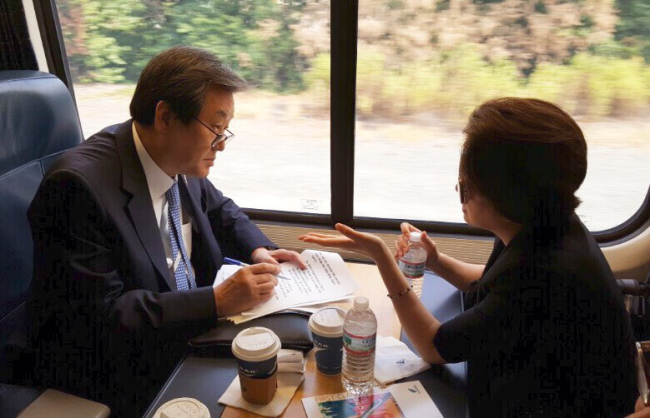Ruling Saenuri Party chief Rep. Kim Moo-sung, appeared to be having a heyday in his stay in the U.S. over the past week, making comments that would have immediately caused backlash back home, but that nonetheless galvanized his conservative support base.
The height of such remarks was his announcement Saturday when he said his party would push for reinstating a system of all schools using government-published textbooks to address what they consider to be a “biased view” imposed by some private publishers’ progressive textbooks.
“I think that left-wing flanks have a wrong sense of history and they are trying to instill their biased view in the young people who will lead our country,” Kim said in a meeting with Koreans who reside in Los Angeles, U.S.
“We are trying to bring back a state-authorized textbook system to prevent this trend,” said Kim.
 |
| Saenuri Party leader Rep. Kim Moo-sung reviews a speech he is set to give at Columbia University on a train for New York last Wednesday. (Yonhap) |
His remark came amid his first visit to the U.S. since he became the leader of the Saenuri Party.
During the eight-day visit, he has made similar moves that were deemed to consolidate his support base, mostly right-wing voters who value the Korea-U.S. alliance and conservative policies such as state-authorized history textbooks.
Not only did he point out that Korea’s alliance with the U.S. outweighs Korea-China relations, he also pulled out all stops to highlight the importance of the ruling conservative party holding on to power. He said he would even sacrifice “his life” for achieving the goal.
Critics accused his move of being “outdated” and “inappropriate” as a leader of the ruling party.
Chu Chin-oh, history professor at Sangmyung University, compared his move to the rhetoric used by right-wing Japanese politicians in their attempts to whitewash history by revising its textbooks.
“A state-authorized textbook system clashes with democratic values,” Chu said.
“The reason we teach history is we want (our students) to reflect on what was wrong and learn from it. I think state textbooks could serve as a tool that only serves the values of one side,” Chu said.
Other critics, such as Yoon Pyung-joong, political science professor at Hanshin University, said that Kim went “overboard” with his controversial remarks in the U.S. and his lopsided focus on conservative voters would backfire on him in the upcoming 2017 presidential election. Kim continues to enjoy a lead in the latest survey for likely candidates.
“(Some of Kim’s remarks) are clearly uncalled for,” said Yoon. “Kowtowing to the U.S. veterans and, most importantly, his comments about China are too much. I believe the second one is big mistake in particular, considering his off-the-cuff speech style,” Yoon said.
“Things will be quite different in the 2017 presidential election from the 2012 election where then-presidential candidate Park Guen-hye won. Back then, Park was considered to be an epitome of conservative values and faced arguably the weakest contender from liberal parties. But she won the presidency by a narrow margin,“ said Yoon.
“Thus, moderate voters are going to be critical of Kim who doesn’t have the same political assets as Park. If Kim continues to seek conservative political gains by alienating himself from moderate voters, it would be a dangerous move,” said Yoon.
By Yeo Jun-suk (jasonyeo@heraldcorp.com)

